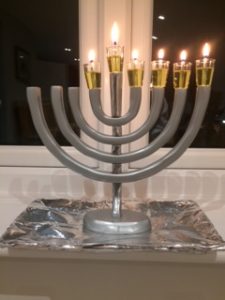
THE SYMBOL OF CHANUKAH IS THE MENORAH. The menorah is the 8 branched candelabra the symbol of Hanukka /Chanukah. The Kitzur Shulchan Orach on Jewish Law and practice composed by Rabbi Shlomo Ganzfried c1864 in Hungary:
During the era of the Second Beis Hamikdash the Greek kingdom was in power. The Greeks imposed evil decrees against the Jewish people, designed to put an end to their religion. They banned them to study the Torah or to perform the mitzvos. Greece plundered their property, [abducted] their daughters, entered the Temple, violating its sanctity and defiling its purity. Israel was in great distress because of them, for they oppressed them bitterly, until the God of our fathers took pity on them and delivered them from their dominion, and rescued them. The Hasmoneans, the sons of the Kohein Gadol defeated and killed them, and delivered Israel from their dominion. The Hasmoneans appointed as king one of the Kohanim. The Kingdom of Israel returned to power and endured for more than two hundred years (from 165BCE), until the destruction of the Second Beis Hamikdash (in 70CE).
On the twenty-fifth of the month of Kislev, Israel triumphed over their enemies and destroyed them. Israel entered the Beis Hamikdash, and found of the pure oil in the Beis Hamikdash only one jar, that was stamped with the seal of the Kohein Gadol. This oil was sufficient to burn for only one day, but they lit the lights of the Menorah with it and it lasted for eight days, until they crushed olives and extracted pure oil. For this reason the Sages of that generation ordained that these eight days, beginning on the twenty-fifth of Kislev, should be days of rejoicing and praise. We kindle lights in the evening near the entrance to the house every night, during these eight nights, in order to display and reveal the miracle. These days are called Chanukah, which means [it is a contraction of] chanu chaf-hei [they rested on the twenty-fifth]. For on the twenty-fifth of Kislev they rested from their enemies.
Another reason [for the name Chanukah] is that during these days they dedicated the Beis Hamikdash [Chanukas habayis], that had been defiled by the oppressors. Some authorities say, therefore, that it is a mitzvah to somewhat increase the meals on Chanukah.
Another reason for celebrating Chanukah is that the construction of the Mishkan was completed during these days. Relate to the family the story of the miracles that were performed for our forefathers, during these days (see Flavius Josephus). Nevertheless, a Chanukah feast is not considered a mitzvah, unless you sing hymns and praises to Hashem during the meal.
On Chanukah you should give charity generously, for the days of Chanukah are auspicious to correct flaws of the soul through the giving of charity, especially when it is given to support poor, Torah scholars.